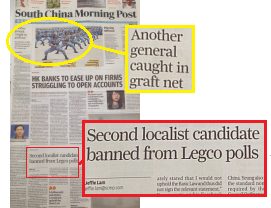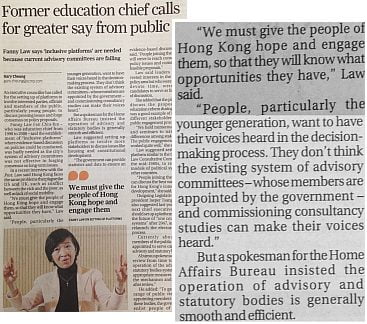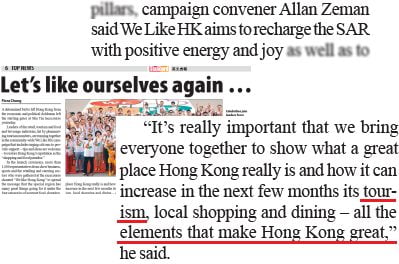If you want a slightly dismal start to Monday, look no further than the front of the South China Morning Post…
Hong Kong’s barring of candidates from running for election because of their opinion is mundane enough to be shoved down to the bottom of the page. At the top (perhaps as a result) an unfortunate juxtaposition in which Beijing grabs another People’s Liberation Army general on corruption charges, while Hong Kong youngsters attend a training camp organized by the, um, PLA. The big lead story in the middle concerns the worthy but yawn-inducing subject of banks rejecting clients for fear of non-compliance with anti-money-laundering rules.
On the back page of the Business section – of all places – is the stuff that gets swept under the carpet: Hong Kong’s extreme inequality and ordinary citizens’ poor prospects.
Is there anything to alleviate the sense of foreboding?
There is a next-Chief Executive sideshow going on: Financial Secretary John Tsang and pro-Beijing veteran Tsang Yok-sing make vague noises about possibly being sort-of willing in principle to ‘serve the community’. But the CE ‘election’ is ultimately stage-managed by Beijing, and this is simply a distraction. The Central Government’s Liaison Office is now running Hong Kong in terms of bolstering state authority and fighting the opposition, and no-one is running the city in terms of social or economic policy.
Mike Rowse is as perplexed as anyone by the Liaison Office’s apparently counter-productive obsession with young localists. If we assume that Chief Executive CY Leung is essentially a puppet, it comes down to the Liaison Office’s boss Zhang Xiaoming. It could be that detecting/creating and then successfully defeating a Splittist Threat to National Security in Hong Kong is the cunning key to his next step up the career ladder in the Communist regime hierarchy. It could be he is a delusional paranoiac out of Leninist central casting. Either way, it is hard to see how John Tsang or Tsang Yok-sing relate to putting this craziness back in its box.
Former Education Secretary Fanny Law proposes a revamp of the government’s public consultation system, to involve youth and create a more inclusive platform for policymaking. Even in later colonial times, the ‘administrative absorption of politics’ was becoming tired. Now, in the 21st Century, you would think we could aim higher than co-opting shoe-shiners – maybe try accountable government, or something?
Instead, Fanny thinks that engaging the kids will let them ‘know what opportunities they have’…
Presumably the opportunities are boundless (hey – ‘Belt and Road’) and the kids are wrong in suspecting otherwise. So this is really the ‘We must communicate better’ argument: everything is excellent, it’s just that the dimwitted masses don’t realize it.
Strip this down to the basic logical conclusion, and the answer to Hong Kong’s problems is happy pills: put soma into the reservoirs and we can all be deliriously harmonious. Cue landlord Allen Zeman and other retail/tourism interests, launching a ‘We Like Hong Kong Being Reduced to Nothing’ campaign to convince the lower orders to enjoy being swamped by millions of overseas visitors buying overpriced crap in tacky malls…
So it’s tourism that makes Hong Kong great, not even the other way round. Yes, this will work. The boss of Sa Sa – dedicated to covering Hong Kong with thousands of cosmetics outlets – says ‘the important thing is that we are united’. A restaurant chain has a bold plan to attract riffraff local customers ‘through offers based on creative ideas’. The organizer of ‘Formula E’ car-racing will give free tickets out to children from low-income families. Hey presto! We all rush to vote Liberal or DAB in September.




It’ s getting to be real fun.
When John and Jasper are considered to be real candidates for the Governorship, you’re forced to laugh, aren’t you?
It’s like a George Formby film. But it’s bound to turn out crap again.
I’m on my way to the supermarket to watch the shelves empty. The it’s into the MTR to see the real panic. The furrowed brows, the damp underarms, the quivering upper lips.
I like a nice typhoon. You’re forced to!
The last time the August 1st PLA anniversary passed with hardly a mention in the Chinese press was back in mid-1980s when Xinhua chose to expose the great Hainan property and stolen vehicle (largely from Hong Kong) scandal on the evening of July 31st. This meant on August 1st in every daily newspaper across the country it would be front page news . The scandal investigators never once mentioned the PLA by name in their report, but the report pushed any of the normally celebratory military news items off the front pages on the one day a year the PLA considers its own. Deng Xiaoping conceived of this method to shame the PLA without mentioning them. Most thinking Chinese immediately and intuitively understood the message. Most non-Chinese observers were clueless. The PLA — the Chinese Navy to be precise — had been criminally colluding with HK and Shenzhen triads as well as senior Hainan Communist officials to steal expensive cars and ship them all over China for resale and property speculation.
Today’s August 1st strikes me as possibly being even worse for the PLA. Little of the subtlety exhibited in the earlier 1980s episode is evident. Today a PLA general is actually named and detained for likely corruption related offenses on the eve of August 1st. This is news that could have been released anytime but it was leaked on the eve of the PLA’s big day. This suggests to me that there could be big trouble brewing in the Chinese military. The failed coup in Turkey and Erdoğan’s massive reaction must have come as a lightening bolt for Xi Jinping.
Today, by the way, I looked at several provincial newspapers in China and none of them carried any substantial mention of the PLA. This is noteworthy.
Indeed, it is noteworthy. August 1st without media fawning of the “People’s” army and comrade Xi’s exhortations of being a lean, mean fighting machine for the 21st century? Very suspect.
Older than old-timer – I vividly remember the car smuggling days – but surely it was the early 90s?
I arrived in Hong Kong in 91, and spent 92-93 as a young orthopaedic surgeon operating on ‘dai fei’ (the ‘big flyer’ speedboats which would do 35 knots with an S class Mercedes on the deck) crew shot by Royal Navy ratings.
My pals in the police claimed that the triads had paid off the mechanics in the police shipyards to slow down the police launches (and presumably their RHIB fast boats).
Meanwhile the Navy was chasing down the dai fei in Zodiacs, coming alongside and jumping on board to cut the fuel lines to the (numerous) big outboards.
The smugglers would attempt to stop this with bamboo poles, as they probably didn’t want to actually kill sailors and police officers.
Naval ratings, faced with being hurled overboard at 35 knots in the dark would shoot the smugglers with their 9mm Browning pistols.
Assuming Navy success, the shot smugglers would end up in the secure ward (essentially an offsite prison) of Queen Mary Hospital, which is where I and my colleagues, of Hong Kong University Department of Orthopaedics, came in, and provided exactly the same care as to any other Queen Mary Hospital.
Meanwhile, any injured Navy men went to the British Military Hospital, which was essentially a cottage hospital, not providing the same level of care. I think any seriously injured member of the military would have been transferred to Queen Mary Hospital, across the road.
The car stealing and smuggling was pretty frenetic for a few years, and stopped fairly rapidly, after Hong Kong and China agreed to ‘limit the supply’ of giant Suzuki outboard motors. Sounded fishy to me. Older than old-timer’s explanation makes far more sense – I’d be interested to know more.
According to ‘Modern China’ by Graham Hutchings, there were two booms in Hainan in that period.
The first was in the early 1980s when “the island’s leaders were granted special powers to develop the local economy by attracting foreign trade and investment on favourable terms. … By 1985 they had imported close to 90,000 vehicles and hundreds of thousands of television sets and video recorders, many of which they sold on at vast profit to customers on the Mainland. Even the navy was involved, shipping the smuggled goods.”
The second was after Deng’s tour through south China in early 1992. “A particularly virulent form of Chinese-style capitalism developed in Hainan. … The dividing line between the cut and thrust of commerce and plain illegality was often paper thin. No less often, it was simply non-existent.”